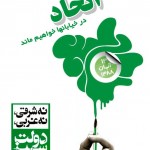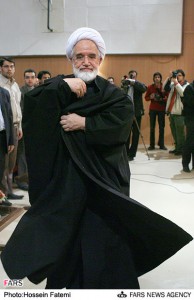Friday
Oct162009
Iran: A Beginner's Guide to the Economy, Past and Present
 Friday, October 16, 2009 at 7:37
Friday, October 16, 2009 at 7:37
The Latest from Iran (16 October): Rumours and Drama, Khamenei and Karroubi
Latest Iran Video: Selling Ahmadinejad’s Economic Plan (13 October)
Receive our latest updates by email or RSS SUBSCRIBE TO OUR FEED
Buy Us A Cup of Coffee? Help Enduring America Expand Its Coverage and Analysis
 EA's newest correspondent, Mohammad Khiabani, introduces us to the economics preceding and accompanying the post-election situation:
EA's newest correspondent, Mohammad Khiabani, introduces us to the economics preceding and accompanying the post-election situation:
The subsidy system that exists in Iran --- one that benefits both individuals and industry by lowering costs of basic daily goods but is highly inefficient and unfair in the distribution of those benefits ---- was never meant to be permanent. It was an expansion of a earlier set of food and energy subsidies that began under the Pahlavi dynasty, as part of the old regime's economic and social policy.
During the 1980s war with Iraq and the US embargo, when Mir Housain Mousavi was Prime Minister of the Islamic Republic (and not too ideologically different from the Revolutionary Guard in his political positions), the subsidy system expanded into a general distribution network that kept consumption in Iran at decent levels. This involved government-run food centers throughout the country, price controls, nationalization of foreign trade, multiple currency exchange rates, and a rationed goods program. Just as in the Battle of London during WWII, when the average Londoner's nutrition levels went up even while the city was being bombed by the Luftwaffe, the effect of this network in Iran was to equalize the consumption of goods. This helped raise the lower classes' living standards even while Iran's wealth declined from the Pahlavi days of its oil-fueled economic "miracle".
However, since the late 1980s, the Iranian regime has slowly dismantled this system. First it opened up to foreign trade, then it aligned its currency rates, then it allowed foreign investment in small parcels, and it finally attempted to tackle the biggest problem of readjusting the prices of basic goods so that they adjust according to market fluctuations. This is a noble goal, because the richest Iranians get the most benefit from the subsidies of food, energy, and gasoline, simply because they consume more of everything. The Islamic Republic has also, in conjunction with slow economic liberalization, expanded the social safety net for its population over the last 20 years, with a combination of decentralized primary health centers in rural and urban areas, large social insurance funds that operate under the category of "non-governmental" organizations, and initiatives to give everyone at least some form of pension and health insurance.
This long process, seen up close, looks like chaos. But if you step back, it has an odd logic to it, and it has contributed to comparatively good standards of living in Iran versus other middle-income countries, as measured by life expectancy, literacy (including amongst females in a region where rates are historically low), and low infant mortality. If you read Thursday's Wall Street Journal article on China's unraveled health care system, which used to be one of the best in the Third World, Iran does not look that bad.
What does this mean? Yes, social policy in Iran is imbued with politics, just as in any large state (look no further than the daily grind on Capitol Hill in Washington). Factions exist, with constituencies, and they jockey for power and recognition of successful policies.
It is all too forgotten now that privatization, subsidy reform, foreign investment, and welfare expansion were all part of the Khatami administration's economic plans between 1997 and 2005. And in a very Clintonesque move, Ahmadinejad has borrowed some of the best ideas of his predecessor and claimed them as his own. It seems now that the current (and very tendentious) alignment of factions in the Majles has fostered the political will to actually pass a restructuring of subsidies, while those conditions did not exist in the second Khatami term.
Daily politics in Iran has lineages deeply embedded in its past. Even the Revolutionary Guard's intervention in the economy stems from the after-effects of the 1980s war, when President Rafsanjani utilized Guard manpower and engineering expertise for the reconstruction of the country. This also had the added benefit of keeping hundreds of thousands of Iranian veterans employed, with a few of them getting quite rich in the process.
It is difficult to predict how well the government will pull off a restructuring of the subsidy system. While a much smaller implementation of gasoline rationing two years ago resulted in a few instances of gas stations being attacked, today the measure is seen as a success and discussed as a microcosm for the reforms. Plans to utilize the social security system of Iran to distribute cash and aid to the lower 50% of Iranians to offset incoming higher prices may actually expand and strengthen the social safety net. This may also inadvertently decrease the power of religious foundations such as the Imam Khomeini Relief Committee, widely criticized as a non-transparent charity organization, but currently very influential in poor Iranians' lives.
Any look through the microscope at Iranian politics must not be blinkered. Instead, it should be accompanied with a longer-term perspective on Iran's economy and society, one that allows us to talk about Iran with the same kind of language and terminology we use to talk about Turkey, Mexico, China, and any large middle-income country.
Latest Iran Video: Selling Ahmadinejad’s Economic Plan (13 October)
Receive our latest updates by email or RSS SUBSCRIBE TO OUR FEED
Buy Us A Cup of Coffee? Help Enduring America Expand Its Coverage and Analysis
 EA's newest correspondent, Mohammad Khiabani, introduces us to the economics preceding and accompanying the post-election situation:
EA's newest correspondent, Mohammad Khiabani, introduces us to the economics preceding and accompanying the post-election situation: The subsidy system that exists in Iran --- one that benefits both individuals and industry by lowering costs of basic daily goods but is highly inefficient and unfair in the distribution of those benefits ---- was never meant to be permanent. It was an expansion of a earlier set of food and energy subsidies that began under the Pahlavi dynasty, as part of the old regime's economic and social policy.
During the 1980s war with Iraq and the US embargo, when Mir Housain Mousavi was Prime Minister of the Islamic Republic (and not too ideologically different from the Revolutionary Guard in his political positions), the subsidy system expanded into a general distribution network that kept consumption in Iran at decent levels. This involved government-run food centers throughout the country, price controls, nationalization of foreign trade, multiple currency exchange rates, and a rationed goods program. Just as in the Battle of London during WWII, when the average Londoner's nutrition levels went up even while the city was being bombed by the Luftwaffe, the effect of this network in Iran was to equalize the consumption of goods. This helped raise the lower classes' living standards even while Iran's wealth declined from the Pahlavi days of its oil-fueled economic "miracle".
However, since the late 1980s, the Iranian regime has slowly dismantled this system. First it opened up to foreign trade, then it aligned its currency rates, then it allowed foreign investment in small parcels, and it finally attempted to tackle the biggest problem of readjusting the prices of basic goods so that they adjust according to market fluctuations. This is a noble goal, because the richest Iranians get the most benefit from the subsidies of food, energy, and gasoline, simply because they consume more of everything. The Islamic Republic has also, in conjunction with slow economic liberalization, expanded the social safety net for its population over the last 20 years, with a combination of decentralized primary health centers in rural and urban areas, large social insurance funds that operate under the category of "non-governmental" organizations, and initiatives to give everyone at least some form of pension and health insurance.
This long process, seen up close, looks like chaos. But if you step back, it has an odd logic to it, and it has contributed to comparatively good standards of living in Iran versus other middle-income countries, as measured by life expectancy, literacy (including amongst females in a region where rates are historically low), and low infant mortality. If you read Thursday's Wall Street Journal article on China's unraveled health care system, which used to be one of the best in the Third World, Iran does not look that bad.
What does this mean? Yes, social policy in Iran is imbued with politics, just as in any large state (look no further than the daily grind on Capitol Hill in Washington). Factions exist, with constituencies, and they jockey for power and recognition of successful policies.
It is all too forgotten now that privatization, subsidy reform, foreign investment, and welfare expansion were all part of the Khatami administration's economic plans between 1997 and 2005. And in a very Clintonesque move, Ahmadinejad has borrowed some of the best ideas of his predecessor and claimed them as his own. It seems now that the current (and very tendentious) alignment of factions in the Majles has fostered the political will to actually pass a restructuring of subsidies, while those conditions did not exist in the second Khatami term.
Daily politics in Iran has lineages deeply embedded in its past. Even the Revolutionary Guard's intervention in the economy stems from the after-effects of the 1980s war, when President Rafsanjani utilized Guard manpower and engineering expertise for the reconstruction of the country. This also had the added benefit of keeping hundreds of thousands of Iranian veterans employed, with a few of them getting quite rich in the process.
It is difficult to predict how well the government will pull off a restructuring of the subsidy system. While a much smaller implementation of gasoline rationing two years ago resulted in a few instances of gas stations being attacked, today the measure is seen as a success and discussed as a microcosm for the reforms. Plans to utilize the social security system of Iran to distribute cash and aid to the lower 50% of Iranians to offset incoming higher prices may actually expand and strengthen the social safety net. This may also inadvertently decrease the power of religious foundations such as the Imam Khomeini Relief Committee, widely criticized as a non-transparent charity organization, but currently very influential in poor Iranians' lives.
Any look through the microscope at Iranian politics must not be blinkered. Instead, it should be accompanied with a longer-term perspective on Iran's economy and society, one that allows us to talk about Iran with the same kind of language and terminology we use to talk about Turkey, Mexico, China, and any large middle-income country.


 2025 GMT: Grand Ayatollah Montazeri
2025 GMT: Grand Ayatollah Montazeri  From an Enduring America correspondent inside Iran:
From an Enduring America correspondent inside Iran: